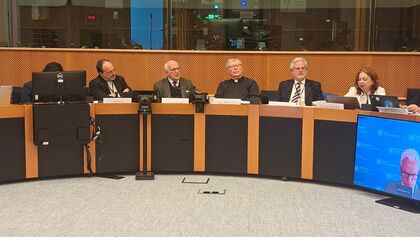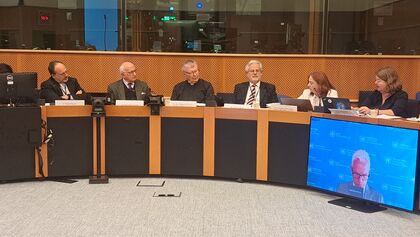AI and Human Trafficking | European Parliament
30th September 2025
At the conference on AI and Human Trafficking, held at the EU on 30 September, speakers from the UNODC, the EU Anti-Trafficking Co-ordinator, and the Head of Governance and Regulatory Policy Sector underlined the urgency of addressing how artificial intelligence is already intersecting with criminal activity. With AI developing at unprecedented speed and crime increasingly moving into the digital sphere, the consensus was clear: action cannot be delayed.
AI has huge potential in assisting law enforcement through the identification of anomalous patterns on financial transactions and supply chains; real-time facial recognition and the computational power to disrupt criminal networks. There are considerable benefits for law enforcement, many of which continue to emerge. And while not a panacea, AI can certainly be a useful tool in identifying victims and disrupting criminal networks. However, these potential benefits need to be balanced by the requirements to be compliant with the fundamental rights of EU citizens.
It is precisely this balance of risk and benefit that has to be balanced to assist law enforcement, while safeguarding EU citizens both now, but more importantly in the future as this technology develops further. Indeed, it was acknowledged that the potential outcomes of developing AI is unknown and maybe unknowable.
Areas that need to be urgently addressed are the need for significant resources to enable increased law enforcement capacity (although the increased resource agreed by the EU for Europol to enable better inter-State law enforcement collaboration was pointed to as a step in the right direction). There is also a need for increased digital expertise in law enforcement alongside further training. This needs to be across all 27 countries in the EU as speakers acknowledged that criminals will always target the weakest link, especially on an often trans-national crime like human trafficking.
Speakers argued for a strong legal framework to be put in place. This legal framework would be assisted by improved collaboration between the public and the private sector. However, it was agreed that tech companies, as the designers and manufacturers of AI and other digital tools needed to be doing far more to ensure protections and also to prevent criminality.
A final area of discussion was the issue of whether compliance was sufficient. Digital machine learning is neither inherently good nor bad. However, while AI might be morally neutral (as currently conceived), as humans we are not and we have a choice as to how this technology is used.





